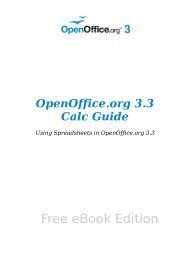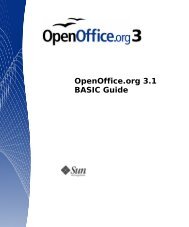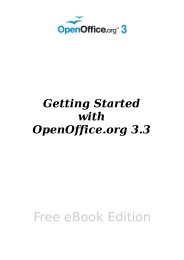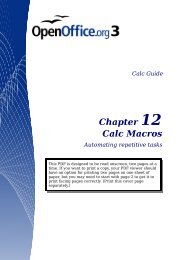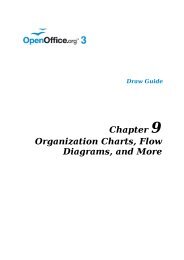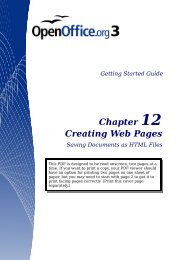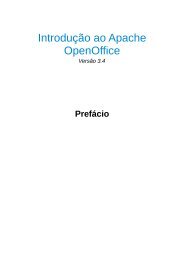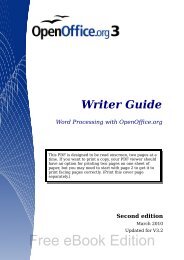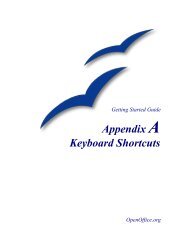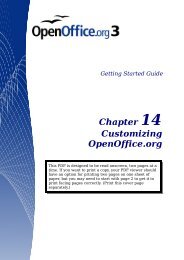OpenOffice.org BASIC Guide.pdf - OpenOffice.org wiki
OpenOffice.org BASIC Guide.pdf - OpenOffice.org wiki
OpenOffice.org BASIC Guide.pdf - OpenOffice.org wiki
Create successful ePaper yourself
Turn your PDF publications into a flip-book with our unique Google optimized e-Paper software.
Database Access 205<br />
""Customer""")<br />
If Not IsNull(ResultSet) Then<br />
While ResultSet.next<br />
MsgBox ResultSet.getString(1)<br />
Wend<br />
End If<br />
Once the database connection has been established, the code used in the example first uses<br />
the Connection.createObject call to create a Statement object. This Statement object then<br />
uses the executeQuery call to return the actual ResultSet. The program now checks<br />
whether the ResultSet actually exists and traverses the data records using a loop. The<br />
values required (in the example, those from the CustomerNumber field) returns the<br />
ResultSet using the getString method, whereby the parameter 1 determines that the call<br />
relates to the values of the first column.<br />
The ResultSet object from SDBC is comparable with the Recordset object from DAO and ADO, since<br />
this also provides iterative access to a database.<br />
The database is actually accessed in <strong>OpenOffice</strong>.<strong>org</strong> through a ResultSet object. This reflects the<br />
content of a table or the result of a SQL-SELECT command. In the past, the ResultSet object provided<br />
the resident methods in the Application object for navigation within the data, for example,<br />
DataNextRecord ).<br />
Type- Specific Methods for Retrieving Values<br />
As can be seen in the example from the previous section, <strong>OpenOffice</strong>.<strong>org</strong> provides a<br />
getString method for accessing table contents. The method provides the result in the form<br />
of a string. The following get methods are available:<br />
getByte()<br />
supports the SQL data types for numbers, characters and strings<br />
getShort()<br />
getInt()<br />
supports the SQL data types for numbers, characters and strings<br />
supports the SQL data types for numbers, characters and strings<br />
getLong()<br />
supports the SQL data types for numbers, characters and strings<br />
getFloat()<br />
supports the SQL data types for numbers, characters and strings<br />
getDouble()<br />
supports the SQL data types for numbers, characters and strings<br />
getBoolean()<br />
supports the SQL data types for numbers, characters and strings<br />
getString()



